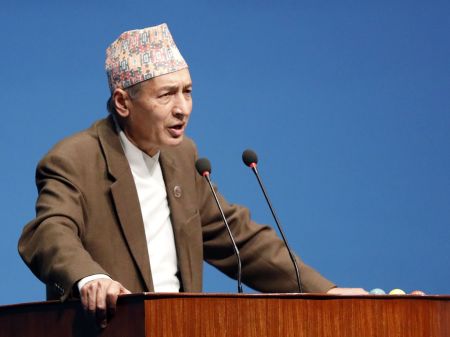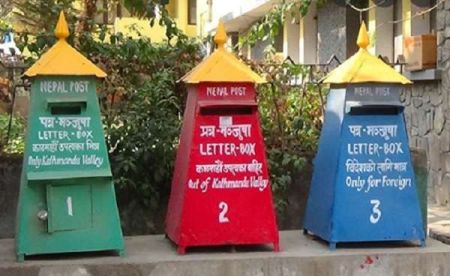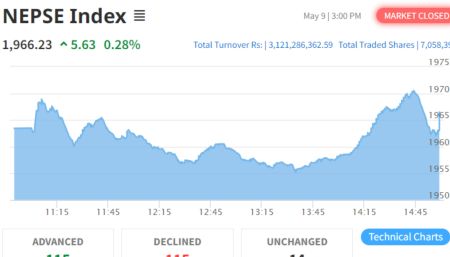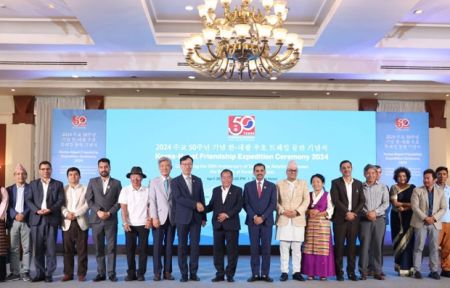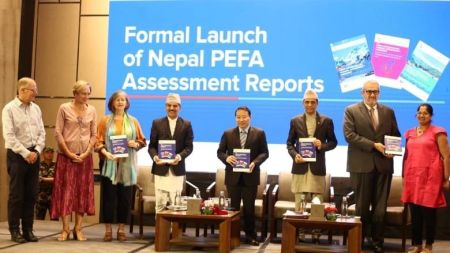For a developing country like Nepal with a substantial demand for investment, development finance institutions (DFIs) are becoming an important alternative source of financing, especially for private sector capital growth.
BY NEWBIZ TEAM
On October 31, 2023, the Government of Nepal entered into a memorandum of understanding with six development finance institutions (DFIs) in London. It was a first-of-its-kind collaboration where a consortium of DFIs came together to sign such an agreement with the government to make a joint effort aimed at cultivating a favourable investment atmosphere, particularly emphasising the overhaul and modernisation of regulatory frameworks.
Gyan Chandra Acharya, Nepal's Ambassador to the United Kingdom, and Jörg Frieden, Chairman of the Board of Directors of SIFEM AG, signed the MoU. The participating DFIs include British International Investment (BII), BIO – the Belgian Investment Company for Developing Countries, FMO – the Dutch entrepreneurial development bank, Finnfund, Proparco of France, and SIFEM (Swiss Investment Fund for Emerging Markets).
The collaboration between the government and the six DFIs, if materialised as envisioned, would pave the way for increased participation of DFIs in Nepal where such institutions have already started making their presence felt. In a developing nation like Nepal, where there is substantial demand for investments, DFIs are becoming a vital alternative financing source, especially for the private sector. DFIs, specialised development banks established by developed countries or international development funds to bolster private-sector development in developing nations, hold a growing portion of foreign direct investment in Nepal.
Multilateral DFIs like the Asian Development Bank (ADB) and International Finance Corporation (IFC) have been investing in Nepal's private sector development for the past four decades. However, bilateral DFIs such as FMO – the Dutch Entrepreneurial Development Bank, the Development Finance Corporation (DFC) of the US, British International Investment (BII), SIFEM, DFC, DEG, SwedFund, FinnFund, and the Dutch Good Growth Fund (DGGF) entered the Nepali market more recently.
When tracing the history of DFIs in Nepal, the pioneering entities were the World Bank and IFC. The World Bank's inaugural private sector financing in Nepal was in 1977 with Hotel Yak and Yeti, while IFC invested in Bhotekoshi in the mid-1990s. Additionally, ADB provided a loan of $9.5 million (which included a $1.25 million equity investment) for Hyatt Regency Kathmandu in 1995. In 2008, IFC provided a $10 million loan to Buddha Air, with another loan of $6.9 million granted in 2012. Moreover, IFC made an equity investment of $3.8 million in Probiotech Industry in 2014.
DFI Engagement in Nepal
BII, FMO, Swedfund, DFC, JICA, and IFC, invested over $100 million in the two Dolma Impact Funds
A consortium of DFIs including FMO, Export and Import Bank of Korea, ADB, AIIB, OPEC Fund, and Proparco invested $453 million in the 216 MW Upper Trishuli-1
IFC signed an agreement to invest $56 million in Global IME Bank in February, 2024
NMB Bank secured a first-of-its-kind $25 million climate finance facility from BII on August 30, 2022.
The US DFC in October 2022 approved a $100 million direct loan to NMB Bank.
The DFC also provided a $45 million direct loan along with a $2.5 million loan portfolio guarantee to Laxmi Bank.
Entry of Bilateral DFIs
There was a notable shift in the engagement of DFIs in Nepal in the 2010s with bilateral DFIs initiating their involvement in the country. Concurrently, with the growing startup ecosystem in Nepal and the gradual entry of private equity (PE) and venture capital (VC) funds, the domain of alternative investments expanded significantly. This expansion provided substantial relief to entrepreneurs looking to scale up their businesses and aspiring individuals seeking to venture into entrepreneurship.
The infusion of DFI investments into Nepali private equity and venture capital funds has played a crucial role in nurturing the growth of new Micro, Small, and Medium Enterprises (MSMEs), fostering innovation and creating employment opportunities. The rise of private equity and venture capital (PE/VC) in Nepal, along with their expanding role in financing, owes much to the support provided by DFIs. Notably, Nepal's two largest PE/VCs – Dolma Fund and Business Oxygen (BO2) – have largely relied on DFI funding for their operation and expansion. "Without DFIs, equity investment in Nepali companies would be significantly limited," Siddhant Raj Pandey, Chairman & CEO of Business Oxygen, said.
The past decade saw these DFIs sustain active engagement across diverse sectors, including SME, energy and hydropower, hospitality, manufacturing, and technology. Their investments flow through various channels, including private equity and venture capital funds, the banking sector, and equity investments.
As DFIs do not have offices in Nepal, they typically engage fund managers to oversee their investments. This practice, according to Shabda Gyawali, Investment Director at Dolma Impact Fund, has set a standard for private equity operations in the country. "Moreover, this involvement has likely groomed potential future CEOs for investment funds in Nepal. Without the initial investment and guidance from DFIs, the private equity ecosystem in Nepal would not have taken shape," he added.
FMO, the Dutch Entrepreneurial Development Bank, was among the pioneering DFIs to invest in the Nepali financial sector. Back in 2008, FMO made an investment in the Clean Energy Development Bank Ltd which has since merged with NMB Bank Ltd. Since then, FMO has injected over $26 million in equity into NMB Bank. Additionally, FMO has shown its commitment to clean energy initiatives in Nepal by co-financing two hydropower projects - Lower Solu in 2014 and Upper Trishuli in 2019.
The involvement of DFIs expanded significantly from 2014 onwards with the launch of two private equity funds – Business Oxygen and Dolma Impact Fund – in Nepal. Business Oxygen Private Limited (BO2) is Nepal’s first private equity fund and plays an important role in the IFC's Global SME Ventures initiative, securing investments from the IFC of the World Bank Group. On the other hand, the Dolma Impact Fund is an international private equity fund focused on investing in Nepal's small and medium-sized enterprises (SMEs) and renewable energy projects across energy, healthcare and technology sectors.
The infusion of DFI investments into Nepali private equity and venture capital funds has played a crucial role in nurturing the growth of new MSMEs, fostering innovation and creating job opportunities.
The two Dolma Impact Funds launched by Dolma Fund Management have collectively raised over $100 million, primarily with the backing of DFIs such as BII, FMO, Swedfund, DFC, JICA, and IFC, among others. In 2021, FMO, BII, Swedfund, DFC and IFC collectively invested $50 million in Dolma Impact Fund II.
Another major player in Nepal is the British International Investment (BII), formerly known as CDC Group, the British government's development finance institution. Since 2019, the BII has made investments of over $100 million in Nepal. The BII made a formal entry into Nepal in 2019 when it announced a $12 million equity investment in WorldLink, one of Nepal's leading internet service providers. Four years later, in 2023, the BII made another round of investment in WorldLink infusing an additional $8.4 million. In 2019, BII joined other DFIs, including FMO, Export and Import Bank of Korea, Asian Development Bank, Asian Infrastructure Investment Bank, Korea Development Bank, OPEC Fund, and Proparco to invest in the Upper Trishuli-1 Hydroelectric Project. Together, these DFIs provided a total of $453 million in debt financing for the 216 MW capacity project, employing a consortium financing model.
Nepal as a frontier market
As Nepal sets out on its ambitious path to attain middle-income status by 2030, achieving the Sustainable Development Goals (SDGs) will be paramount. Private investment is poised to play an important role in this pursuit. However, with private capital investment still at a relatively low level, with private fixed capital formation-to-GDP standing at just 23%, foreign capital emerges as a crucial source of development funding for Nepal. This is precisely where DFIs see their role in Nepal. Bilateral DFIs participate in direct investments within the market, engaging with businesses and leveraging financial intermediaries such as banks and PE/VC fund managers. Through these channels, DFIs provide the essential capital required for the growth and development of the private sector.
Given Nepal's status as a fragile state with comparatively lower Foreign Direct Investment (FDI) inflows, DFIs are seizing the opportunity to establish a track record in the country. Investing in emerging and frontier markets like Nepal enables DFIs to enhance their credibility and showcase success, potentially attracting conventional investors in the future. However, large commercial investors often perceive Nepal as a nation with low GDP growth, inadequate infrastructure and political uncertainty, which act as deterrents to investment. In this context, impact investors, represented by DFIs, are stepping up and actively engaging in Nepal's development landscape.
Therefore, despite DFI activity being relatively lower in Nepal compared to its regional counterparts, both in terms of the number and size of deals, DFIs continue to represent a significant segment of the impact investing market. They account for more than 90% of the total deployed impact investing capital in the country. According to Former Finance Secretary Rameshore Khanal, Nepal must maximise the utilisation of DFI funds. Instead of solely relying on domestic resources for projects with promising Economic Rates of Return (ERR) and Financial Rate of Return (FRR), it will be beneficial for Nepal to leverage DFI capital with lower interest rates. "However, Nepal has yet to harness DFI investments to the extent observed in countries like Vietnam and Cambodia," Khanal added.
Economist Dr Poshraj Pandey agreed with Khanal. "Since multilateral donors like the World Bank and ADB typically do not directly invest in the private sector, DFIs serve as a channel for direct financing to the private sector. Therefore, there exists the potential for heightened financing from DFIs to the private sector," he added.
Funding through debt instrument
The financial sector is one of the areas where DFIs have been engaged actively in Nepal. Be it IFC, BII, DFC or FMO, all have either made equity investments or loan investments to Nepali commercial banks. Two policy decisions made by Nepal Rastra Bank (NRB) in 2018 and 2021 paved the legal way for Nepali commercial banks to borrow from foreign BFIs in convertible foreign currency. These policy changes opened ways for Nepali banks to leverage debt capital. In response to the shortage of loanable funds in 2018, the NRB permitted commercial banks to borrow funds equivalent to up to cent per cent of their primary capital from foreign financial institutions. Since then, leading commercial banks like NMB Bank, Laxmi Bank, Siddhartha Bank, Global IME Bank and Sanima Bank have borrowed from DFIs. "During the recent liquidity crisis, DFI funding played a crucial role in assisting the banks," said Pandey.
The latest such borrowing was made on February 2, 2024, when IFC signed an agreement to invest $56 million in Global IME Bank to help increase access to finance for small businesses in Nepal, including women-owned firms and foster climate-friendly projects. The IFC-Global IME partnership aims at boosting competitiveness in the SME finance market, while also improving financial inclusion, creating jobs and supporting the nation's climate goals. One year earlier, on May 17, 2023, IFC made an investment of $55 million in Siddhartha Bank to increase access to finance for small businesses and to foster climate finance in Nepal.
Likewise, NMB Bank secured a first-of-its-kind $25 million climate finance facility from BII on August 30, 2022. The loan was extended to bolster the NMB Bank's financing capacity for hydropower and other renewable energy projects. The $15 million loan provided to NMB by BII in 2018 offered some temporary relief with regard to such liquidity constraints.
The US Development Finance Corporation (DFC) in October 2022 approved a $100 million direct loan to NMB Bank, the largest of its kind for a Nepali bank to cater to the financing needs of MSMEs in Nepal. NMB Bank has already on-boarded nine development finance institutions (DFIs), including DFC, for a total borrowing size of $301.50 million directed towards hydropower, renewable energy, agriculture, and small and medium enterprises.
The DFC also provided a $45 million direct loan along with a $2.5 million loan portfolio guarantee to Laxmi Bank. This facility aims at furnishing capital for on-lending to MSMEs involved in agribusiness in Nepal.
Bankers say DFIs are increasingly seeing Nepal as a market for them. Sunil KC, CEO of NMB Bank, said that although his bank was the frontrunner to receive funding from the DFIs, many Nepali commercial banks have also started working with them. "They (DFIs) are also providing technical support to the banks to finance the sectors that help to tackle climate change and environmental protection," KC added.
However, there is a caveat in the DFIs' loan investing. Bankers say Nepali banks, of late, have shown little interest in obtaining funding from DFIs due to the high interest rates associated with foreign exchange loans. "While interest rates on loans from domestic banks have seen a sharp decline, the interest rates on dollar loans have gone up. With banks experiencing an influx of liquidity, there is currently no pressing need for Nepali banks to seek loans from DFIs," said KC.
According to KC, the current interest rate on fixed deposits in Nepali banks stands at 6.5%, while the interest rate on dollar loans has surged to 5.5%. "Moreover, additional charges must be accounted for, elevating the interest rate to around 8%, and factors such as hedging and taxation further inflate the interest rate to approximately 12%," said KC. With banks currently holding substantial liquidity reserves and domestic borrowing costs being lower, borrowing from abroad has not been particularly appealing for banks at the moment. However, bankers contend that the contribution of external financing during a period when the country faced acute liquidity shortages cannot be overlooked.
The current environment of high interest rates in the international market, however, may not persist indefinitely. Additionally, Nepal has experienced a cyclical pattern of excess liquidity and liquidity crunch, occurring every 3-4 years in recent times. During periods when the banking sector faces a liquidity crunch, DFI lending can be invaluable for both banks and enterprises seeking external funding directly.
Looking ahead
Until now, debt has been the favoured instrument for the majority of impact investments in Nepal as DFIs, according to stakeholders, are evaluating market viability. Equity transactions require approval from the country’s central bank, a process that is protracted and lacks clarity, leaving investors uncertain about the outcome. Additionally, domestic investors face the risk of being blacklisted from financial markets or services if they provide equity to a failing company. Although foreign investors have recently been exempted from these regulations, the ambiguity persists which impacts investment decisions in the equity sphere.
Stakeholders say that DFIs are closely monitoring Nepal's trajectory following its graduation from the Least Developed Country (LDC) status in 2026. They are particularly interested in Nepal's policies regarding foreign investment repatriation once it attains middle-income status. Consequently, only a limited number of DFIs are currently prepared to make direct investments. According to Pandey, DFIs have undertaken significant risks by investing in Nepal. “If these investments become fruitful, they will attract similar international funding agencies to invest in the country,” he added. To further engage DFIs on a broader scale, Pandey suggests two additional measures: implementing a hedging policy against foreign exchange risks and establishing a sovereign credit rating. "Since borrowing from abroad involves foreign exchange risks, it is crucial to introduce a hedging policy that delineates the distribution of risk among DFIs, the Nepali government, and the private sector," Pandey emphasised.
Despite garnering sufficient attention from corporates, the visibility and presence of DFIs within the private sector remain limited. Engagement between the Nepali private sector, particularly corporate houses, and DFIs has been minimal. Moreover, due to DFIs' stringent adherence to environmental, social and governance (ESG) measures in their investments, there seems to be reluctance within the Nepali private sector regarding DFI investments. "As ESG issues are critical for DFIs, the willingness of the private sector to adhere to these standards remains a significant concern," said Gyawali.
Equity investment in Nepali companies would be significantly constrained in the absence of DFIs. They have made direct equity investments in Nepal, as well as investments through private equity firms, and have also provided lending through commercial banks. The environment for DFI funding to flourish is becoming increasingly favourable. There is a need to bring about reforms in our policies and regulations to facilitate this growth. Implementing a hedging policy and having a sovereign rating are essential steps to attract more investments from DFIs.
DFIs have collectively made equity investments totaling $150-160 million in Nepal so far. Considering Nepal's status as a fragile state with relatively lower foreign direct investment (FDI) inflows, DFIs are seeing their presence here as an opportunity to establish a track record. Investing in emerging and frontier markets like Nepal allows them to build credibility and demonstrate success, potentially attracting conventional investors in the future. The private equity ecosystem wouldn't have taken shape in Nepal without the initial investment and guidance from DFIs. Capital flows to places where it is welcomed and treated favourably. If Nepal wants DFIs to contribute to its economic growth, it must ensure a hospitable environment for them. This involves clarifying taxation and regulatory frameworks to provide certainty and stability.
Investments by DFIs in Nepal have a long history. Notably, the IFC has provided loans to entities such as WorldLink, Buddha Air, and Incessant Rain. Projects like Hyatt Regency Kathmandu, and Butwal Spinning Mills have received private-sector loans from the ADB. Nepal must maximise the utilisation of DFI funds. Instead of solely relying on domestic resources for projects with promising Economic Rates of Return (ERR) and Financial Rate of Return (FRR), leveraging DFI capital with lower interest rates can be beneficial for Nepal. However, Nepal has yet to harness DFI investments to the extent observed in countries like Vietnam and Cambodia.
DFIs serve as intermediaries, playing a crucial role in channelling financing to the private sector, particularly in countries like Nepal where institutions like the World Bank and ADB typically do not directly invest in the private sector. This opens up the potential for increased financing from DFIs to the private sector. Engaging DFIs on a larger scale necessitates two additional measures: implementing a hedging policy against foreign exchange risks and establishing a sovereign credit rating. Given the foreign exchange risks associated with borrowing from abroad, it is essential to introduce a hedging policy that delineates the distribution of risk between DFIs, the government and the private sector. While the repatriation of investments made by DFIs is governed by the FITTA, they have raised concerns about bureaucratic hurdles. The existing requirement to obtain approval from both the Department of Industry and Nepal Rastra Bank has made the process complex.






